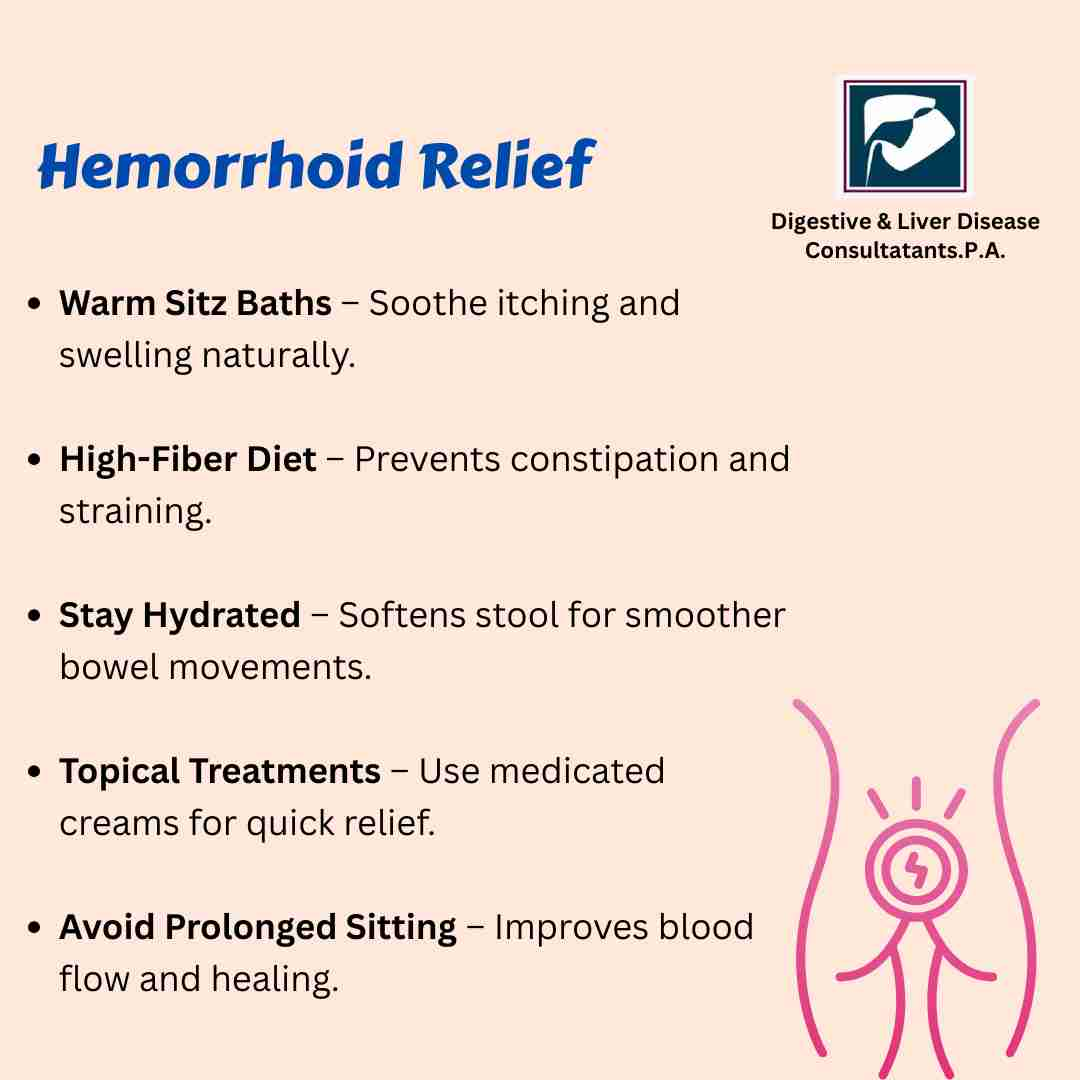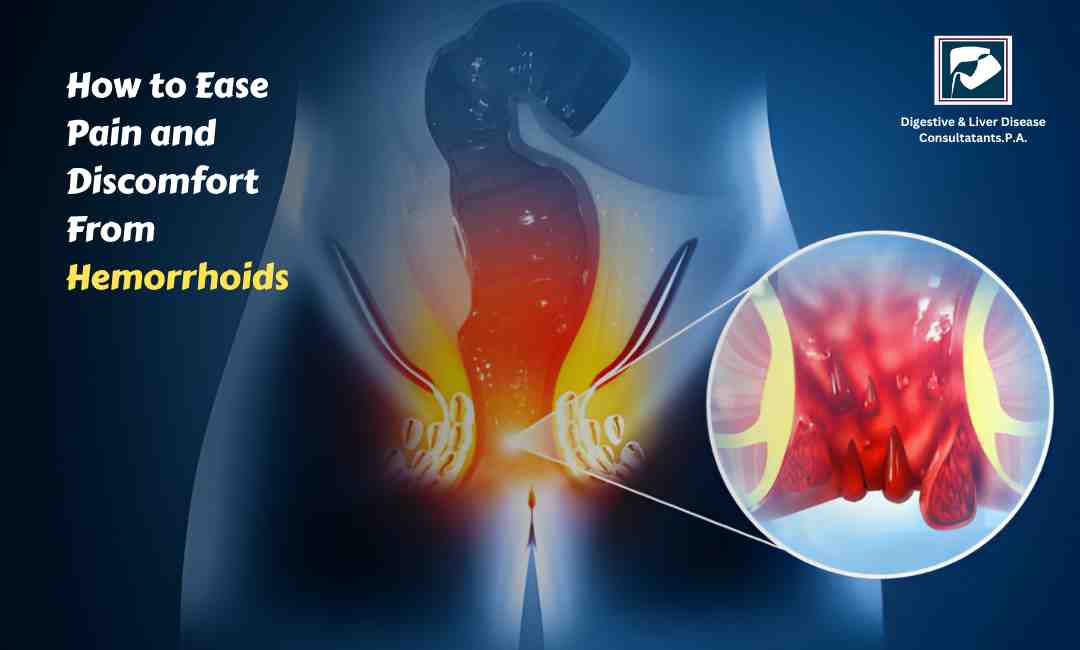Hemorrhoids are one of the most common yet uncomfortable conditions affecting adults. They occur when the veins in the lower rectum or anus become swollen or inflamed, leading to pain, itching, and sometimes bleeding during bowel movements. While hemorrhoids are not usually serious, they can make everyday activities like sitting or walking extremely uncomfortable.
The good news is that there are effective ways to relieve pain and manage symptoms at home, as well as professional treatments that can help if the problem persists. In this blog, we’ll explore how to ease pain and discomfort from hemorrhoids, when to seek medical help, and how specialists at Digestive & Liver Disease Consultants, P.A. can assist you.
What Causes Hemorrhoids?
Hemorrhoids can develop due to increased pressure on the veins around your rectum and anus. Common causes include:
- Straining during bowel movements
- Chronic constipation or diarrhea
- Sitting for long periods
- Pregnancy
- Obesity
- Low-fiber diet
- Aging, which weakens the tissues supporting rectal veins
There are two main types of hemorrhoids:
Internal hemorrhoids – located inside the rectum and usually painless but may cause bleeding
External hemorrhoids – under the skin around the anus, often painful and itchy

Common Symptoms of Hemorrhoids
Recognizing symptoms early can help you manage the condition effectively.
- Pain or discomfort around the anus
- Itching or irritation in the anal area
- Swelling or a small lump near the anus
- Bright red blood after bowel movements
- Mucus discharge or feeling of incomplete bowel emptying
If you experience severe pain, excessive bleeding, or symptoms that do not improve, consult a gastroenterologist promptly.
Home Remedies to Relieve Hemorrhoid Pain
You can often reduce pain and swelling from hemorrhoids with simple home treatments and lifestyle changes.
1. Warm Sitz Baths
Soaking the affected area in warm water for 15–20 minutes several times a day can reduce inflammation, soothe pain, and promote healing. Adding Epsom salt to the water may also help relieve discomfort.
2. Use Over-the-Counter Treatments
Topical creams, ointments, and wipes containing hydrocortisone or witch hazel can temporarily relieve itching and pain. Always follow the product instructions carefully and avoid long-term use of steroid-based creams without a doctor’s advice.
3. Increase Fiber Intake
A high-fiber diet helps soften stools and makes bowel movements easier, reducing strain. Include foods like:
- Whole grains (oats, brown rice, whole wheat bread)
- Fresh fruits and vegetables
- Legumes (beans, lentils)
You may also use fiber supplements such as psyllium husk if dietary changes aren’t enough.
4. Stay Hydrated
Drink plenty of water throughout the day to keep stools soft and prevent constipation. Aim for at least 8 glasses of water daily.
5. Avoid Straining During Bowel Movements
Straining increases pressure on the rectal veins and can worsen hemorrhoids. Go to the bathroom when you feel the urge and avoid sitting on the toilet for long periods.
6. Apply Cold Compresses
Placing an ice pack on the anal area for 10–15 minutes can help reduce swelling and numb pain. Wrap the ice in a clean cloth to prevent skin irritation.
7. Practice Good Hygiene
Gently clean the anal area with warm water after each bowel movement. Avoid using rough toilet paper or perfumed wipes, which can irritate the skin.
8. Wear Loose, Breathable Clothing
Tight clothing can trap moisture and worsen irritation. Choose loose-fitting cotton underwear and avoid sitting for too long.
Medical Treatments for Hemorrhoids
If home remedies don’t provide relief, or if hemorrhoids become severe, a gastroenterologist can recommend safe and effective medical treatments.
Rubber Band Ligation: A small rubber band is placed around the base of the hemorrhoid to cut off blood flow, causing it to shrink and fall off.
Sclerotherapy: A chemical solution is injected into the hemorrhoid to shrink it.
Infrared Coagulation (IRC): A minimally invasive procedure that uses heat to shrink internal hemorrhoids.
Hemorrhoidectomy: Surgical removal of large or severe hemorrhoids.
Stapled Hemorrhoidopexy: A less invasive surgery that repositions hemorrhoids and reduces blood flow to them.
Your doctor will choose the best treatment based on the type, size, and severity of your hemorrhoids.
Preventing Hemorrhoids
To reduce your risk of developing hemorrhoids or prevent them from returning, follow these tips:
- Eat a high-fiber diet rich in fruits, vegetables, and whole grains
- Stay physically active to support healthy bowel movements
- Avoid prolonged sitting, especially on hard surfaces
- Use the bathroom as soon as you feel the urge
- Maintain a healthy weight
When to See a Doctor
Seek medical advice if you notice:
- Persistent or severe pain
- Bleeding during bowel movements
- Large, swollen lumps near the anus
- No improvement with home remedies
These symptoms could also indicate other digestive conditions that need professional evaluation.
About Digestive & Liver Disease Consultants, P.A.
At Digestive & Liver Disease Consultants, P.A., we provide compassionate and comprehensive care for all types of digestive disorders, including hemorrhoids, constipation, rectal bleeding, and other gastrointestinal issues. Our experienced gastroenterologists in Houston, Texas, use advanced diagnostic techniques and personalized treatment plans to ensure the best possible outcomes for each patient.
We focus not only on symptom relief but also on long-term digestive wellness through education, lifestyle guidance, and preventive care.
Conclusion
Hemorrhoids can be painful and disruptive, but with the right care, relief is within reach. Simple lifestyle changes, home remedies, and timely medical treatment can significantly reduce discomfort and prevent recurrence.
If you are experiencing ongoing pain, bleeding, or discomfort from hemorrhoids, don’t wait for the symptoms to worsen.
Schedule an appointment with Digestive & Liver Disease Consultants, P.A. today. Our expert gastroenterologists can diagnose your condition accurately and recommend the most effective treatment for lasting relief.






